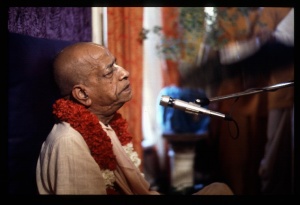CC Madhya 22.137-139 (1975)

A.C. Bhaktivedanta Swami Prabhupada
TEXTS 137-139
- sa vai manaḥ kṛṣṇa-padāravindayor
- vacāṁsi vaikuṇṭha-guṇānuvarṇane
- karau harer mandira-mārjanādiṣu
- śrutiṁ cakārācyuta-sat-kathodaye
- mukunda-liṅgālaya-darśane dṛśau
- tad-bhṛtya-gātra-sparaśe 'ṅga-saṅgamam
- ghrāṇaṁ ca tat-pāda-saroja-saurabhe
- śrīmat-tulasyā rasanāṁ tad-arpite
- pādau hareḥ kṣetra-padānusarpaṇe
- śiro hṛṣīkeśa-padābhivandane
- kāmaṁ ca dāsye na tu kāma-kāmyayā
- yathottamaḥśloka-janāśrayā ratiḥ
SYNONYMS
saḥ—he (Mahārāja Ambarīṣa); vai—certainly; manaḥ—the mind; kṛṣṇa-pada-aravindayoḥ—on the two lotus feet of Kṛṣṇa; vacāṁsi—words; vaikuṇṭha-guṇa-anuvarṇane—in describing the transcendental character of Kṛṣṇa; karau—the two hands; hareḥ—of Lord Kṛṣṇa or Viṣṇu; mandira-mārjana-ādiṣu—in cleansing the temple of Hari and similar other duties; śrutim—the ears; cakāra—engaged; acyuta—of the Lord; sat-kathā-udaye—in the arising of transcendental topics; mukunda-liṅga—of the Deities of the Lord; ālaya—temples; darśane—in visiting; dṛśau—the two eyes; tat-bhṛtya—of the servants of the Lord; gātra—the bodies; sparaśe—in touching; aṅga-saṅgamam—bodily contact such as embracing or touching the lotus feet; ghrāṇam—the sensation of smell; ca—and; tat-pāda-saroja—of the Lord's lotus feet; saurabhe—in the fragrance; śrīmat—most auspicious; tulasyāḥ—of tulasī leaves; rasanām—the tongue; tat-arpite—in food offered to the Lord; pādau—the two feet; hareḥ—of the Lord; kṣetra—the place of pilgrimage; pada-anusarpaṇe—in walking to; śiraḥ—the head; hṛṣīkeśa—of the Lord of the senses, the Personality of Godhead; pada-abhivandane—in offering prayers at the lotus feet; kāmam—all desires; dāsye—in serving the Lord; na—not; tu—but; kāma-kāmyayā—with a desire for sense gratification; yathā—as much as; uttamaḥ-śloka—of the Lord, who is worshiped by selected poems; jana—in the devotee; āśrayā—having shelter; ratiḥ—attachment.
TRANSLATION
" 'Mahārāja Ambarīṣa always engaged his mind at the lotus feet of Kṛṣṇa, his words in describing the spiritual world and the Supreme Personality of Godhead, his hands in cleansing and washing the Lord's temple, his ears in hearing topics about the Supreme Lord, his eyes in seeing the Deity of Lord Kṛṣṇa in the temple, his body in touching the lotus feet of Vaiṣṇavas and embracing them, his nostrils in smelling the aroma of the tulasī leaves offered to Kṛṣṇa's lotus feet, his tongue in tasting food offered to Kṛṣṇa, his legs in going to places of pilgrimage like Vṛndāvana and Mathurā or to the Lord's temple, and his head in touching the lotus feet of the Lord and offering Him prayers. Thus Mahārāja Ambarīṣa desired only to serve the Lord faithfully. In this way he engaged his senses in the transcendental loving service of the Lord. As a result, he awakened his dormant loving propensity for the Lord's service.'
PURPORT
This is a quotation from Śrīmad-Bhāgavatam (9.4.18-20).